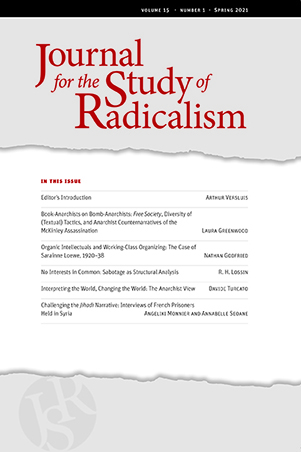
Journal for the Study of Radicalism
Where to Read
The Journal for the Study of Radicalism engages in serious, scholarly exploration of the forms, representations, meanings, and historical influences of radical social movements. With sensitivity and openness to historical and cultural contexts of the term, we loosely define "radicals," as distinguished from "reformers," to mean groups who seek revolutionary alternatives to hegemonic social and political institutions, and who use violent or non-violent means to resist authority and to bring about change. The journal is eclectic, without dogma or strict political agenda, and ranges broadly across social and political groups worldwide, whether typically defined as "left" or "right."
JSR's primary purpose is to serve as a venue for fine scholarship in this developing academic field. We expect contributors to come from a wide range of perspectives and disciplines, and we especially welcome articles that reconceptualize definitions and theories of radicalism, feature underrepresented radical groups, and introduce new topics and methods of study. We seek articles that make a clear larger point, and that offer a conceptual contribution to the field.
All manuscripts submitted for publication consideration must be original work that has not been published previously and is not currently under review by any other publication outlet.
Article submissions to Journal for the Study of Radicalism undergo a double-anonymous peer review process.
The Journal for the Study of Radicalism engages in serious, scholarly exploration of the forms, representations, meanings, and historical influences of radical social movements. With sensitivity and openness to historical and cultural contexts of the term, we loosely define "radical," as distinguished from "reformers," to mean groups who seek revolutionary alternatives to hegemonic social and political institutions, and who use violent or non-violent means to resist authority and to bring about change. The journal is eclectic, without dogma or strict political agenda, and ranges broadly across social and political groups worldwide, whether typically defined as "left" or "right." We expect contributors to come from a wide range of fields and disciplines, including ethnography, sociology, political science, literature, history, philosophy, critical media studies, literary studies, religious studies, psychology, women's studies, and critical race studies. We especially welcome articles that reconceptualize definitions and theories of radicalism, feature underrepresented radical groups, and introduce new topics and methods of study.
